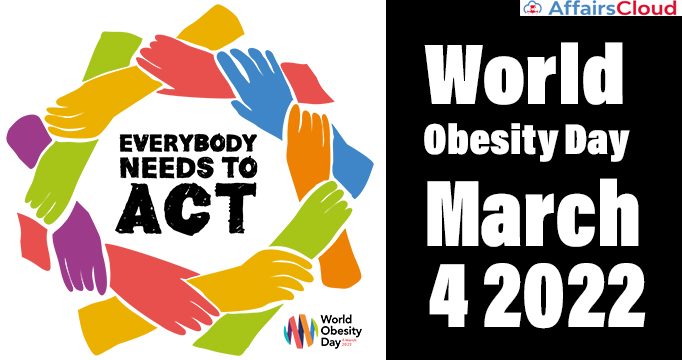 World Obesity Day(WOD) is annually observed across the world on 4th March to promote practical solutions to end the global obesity crisis. The observance of World Obesity Day is organised by the World Obesity Federation (World Obesity), a non-profit organisation in collaboration with its global members.
World Obesity Day(WOD) is annually observed across the world on 4th March to promote practical solutions to end the global obesity crisis. The observance of World Obesity Day is organised by the World Obesity Federation (World Obesity), a non-profit organisation in collaboration with its global members.
- The message/theme of World Obesity Day 2022 is ‘Everybody Needs to Act’, which aims to improve the world’s understanding, prevention, and treatment of obesity.
Significance:
The day enables World Obesity to align members to drive and support obesity-related targets within the United Nations (UN) system as well as through the Global Syndemic recommendations of the Lancet Commission on Obesity.
Background:
i.In 2015, the World Obesity Federation established World Obesity Day as an annual campaign and proclaimed the 11th October of every year as World Obesity Day.
ii.The first ever World Obesity Day was observed on 11th October 2015.
iii.Starting from 2020, the date of World Obesity Day has been changed from 11th October to 4th March.
What is Obesity?
i.Overweight and obesity are defined as abnormal or excessive fat accumulation that presents a risk to health. A Body Mass Index (BMI) of over 25 is considered overweight, and over 30 is obese.
ii.The fundamental cause of obesity and overweight is an energy imbalance between calories consumed and calories expended.
Key Points:
i.Obesity is anticipated to impact over 100 million children under the age of five and over 150 million adolescents under the age of 19 by 2030, accounting for roughly one-eighth of all children and adolescents worldwide (12.91%).
ii.According to the World Health Organisation (WHO) data of 2021, worldwide obesity has nearly tripled since 1975.
iii.From 1975 to 2016, the prevalence of overweight or obese children and adolescents aged 5–19 years increased more than four-fold from 4% to 18% globally.




